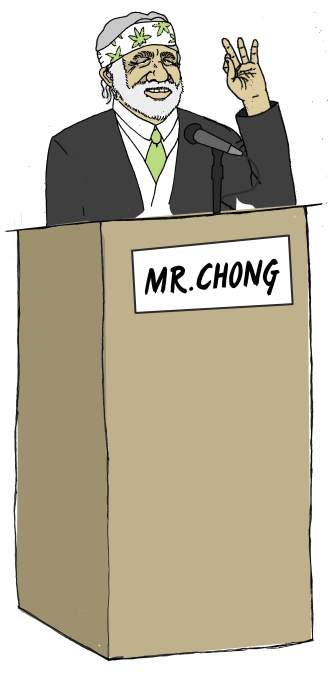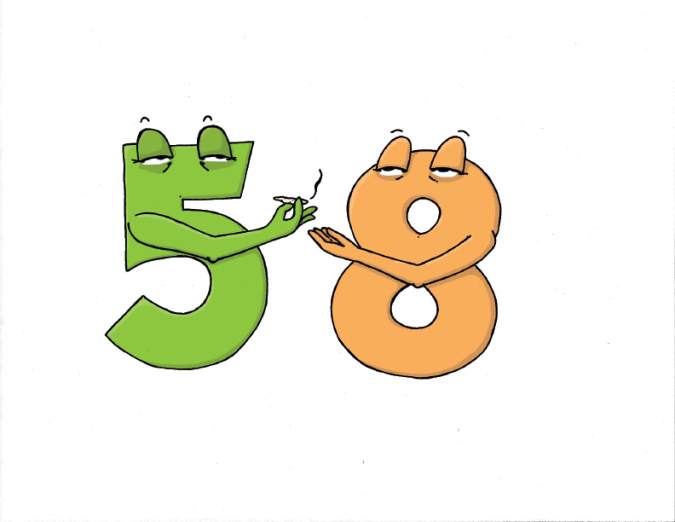Calling out cannabis testing in sports.
Mixed-martial-arts superstar Ronda Rousey is obviously, pound for pound, the most kick-ass fighter in the world, and not to be messed with. She has also ignited a firestorm with her articulate and accurate attack on the idiocy of marijuana testing in her sport. “Rowdy” Rousey made her argument when her friend and training partner, Nick Diaz, was suspended for five years by the Nevada Athletic Association after testing positive for pot.
“I’m sorry, but it’s so not right for him to be suspended five years for marijuana,” Rousey said at a UFC press conference in Melbourne last week. “If one person tests for steroids, that could actually hurt a person, and the other person smokes a plant that makes him happy, and he gets suspended for five years. Whereas a guy who could hurt someone gets a slap on the wrist.”
To make matters worse, UFC fighter Diaz, a popular star in his prime, has a valid medical-marijuana card (from California) and stated he was using medical marijuana for ADHD as well as pain management (of which there is plenty in his brutal full-contact sport). In an absurd side note, Diaz was suspended after a match with the great Anderson Silva, who also failed a drug test—for steroid use. Silva’s punishment? One year. Diaz was suspended for five for having weed in his system—though to be fair, it was the third time in his career Diaz had tested positive for marijuana, making him perhaps not the sharpest tool in the UFC shed. For Diaz, 32, a five-year penalty is essentially a lifetime ban in a sport that takes its toll (and, in my opinion, should be outlawed, along with boxing, NASCAR, motocross, and tackle football).
The whole idea of drug-testing athletes is to see if they’re using substances that may give them a competitive advantage in their chosen sport. It doesn’t take a rocket scientist to understand that cannabis is hardly a performance-enhancing drug (at least until couch-surfing becomes an Olympic sport). Diaz has claimed to use cannabis to heal his body between matches. The World Anti-Doping Agency—one of the many institutions drug-testing MMA athletes—states in its rules that marijuana may not be used “during competition”—and thus it’s quite possible Diaz was not in violation, but still had THC in his system from previous use. (A small amount of marijuana is allowed in the urine samples WADA tests, but one of the three samples taken from Diaz the day of the fight had more THC than is considered acceptable.)
Plenty of athletes over the years have admitted to using marijuana, not as a PED but to relax and unwind—including the world’s greatest runner, Usain Bolt; NBA stars Chris Weber and Allen Iverson; beefcake Arnold Schwarzenegger; and swimming god Michael Phelps.
As in martial arts and boxing, NFL players do a lot of head-banging, and use ganja to manage pain, stress relief, depression, and even help repair neurological damage. And they also get suspended for it. In addition to the dozens of players who have been sent to substance-abuse programs for testing positive for pot, long suspensions were recently given to receivers Josh Gordon (Cleveland Browns) and Martavis Bryant (Pittsburgh Steelers) for firing up. Funny thing about the NFL: They have two separate drug policies—one for PEDs and another for recreational drugs.
Since Washington state legalized cannabis for recreational purposes, our Seattle Seahawks should be able to fire up for fun and not be fined (or suspended) for it, right? Sorry—the commish isn’t going for that. (Though a nonprofit called the Gridiron Cannabis Coalition is working to allow medical marijuana to treat ailments for NFL players.) Thing is, if ganja can give professional athletes relief—from joint pain, headaches and concussions, lack of sleep, soreness, and muscle inflammation—they should have it available. If nothing else, it will give these athletes much-needed liver relief after being prescribed a plethora of addictive and highly toxic painkillers and sleep aids by team doctors.
The only organization that seems to be getting it right on marijuana is the Olympics! The World Anti-Doping Agency (good Lord, does everyone use the same lab?) is responsible for drug-testing athletes who are training and participating in Olympic competitions all over the globe. While cannabis is on the agency’s list of prohibited substances (though not explicitly banned by the International Olympic Committee), they recently upped the allowable amount of THC in an athlete’s system from 15 ng/mL to 150—most likely because they didn’t like the idea of suspending 90 percent of their prime snowboarders and skiers.
The WADA lists various competitive advantages of each drug on their Prohibition List. For cannabis, these include “better focus” and “diminished stress.” Now that I think of it, this may be an advantage in synchronized swimming, dressage, canoe slalom, racewalking, trampoline, and whatever the hell a steeplechase is.
Rules on cannabis and sporting should obviously be changed, and, like full legalization, this will ultimately need to take place at the national level. Nick Diaz had a valid and legal (in California) use for medical marijuana, but ran into a state (and a Commission) that invalidated his legitimate needs. We’ll give the great Rowdy Ronda Rousey the last word on the subject: ”I’m against testing for weed at all. It’s not a performance enhancing drug. And it has nothing to do with competition. It’s only tested for political reasons,” said the champ. “I think we should free Nick Diaz.”





